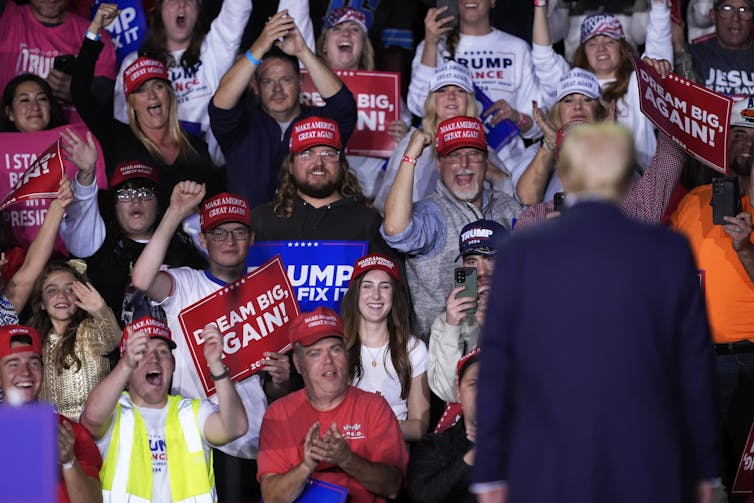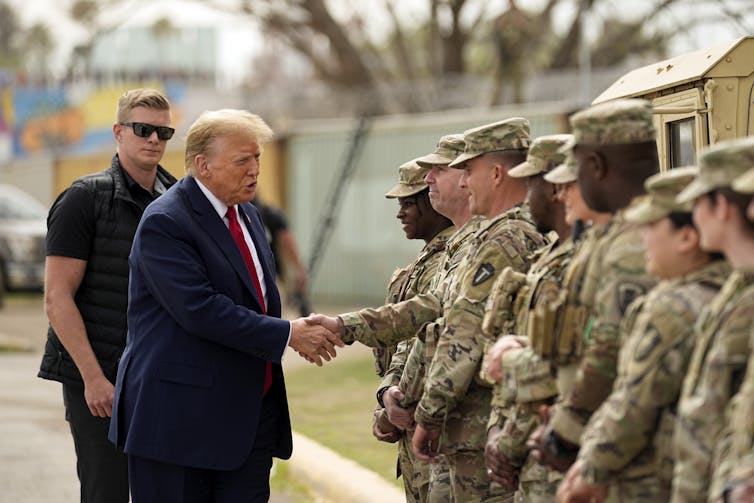United States President Donald Trump has repeatedly floated the idea of remaining in office after his second term ends in 2029. Since the 22nd Amendment of the U.S. Constitution was ratified in 1951, no U.S. president has challenged the two-term limit it established.
However, attempts to circumvent constitutional term limits are not unprecedented elsewhere.
Virtually every country in Latin America has enshrined constitutional term limits as a safeguard against tyranny. These rules vary: some allow only a single term, some permit two, while others enable non-consecutive re-election. Yet several presidents have managed to defy these provisions.
Recent examples include Daniel Ortega in Nicaragua, Hugo Chávez in Venezuela, Evo Morales in Bolivia, Rafael Correa in Ecuador and Nayib Bukele in El Salvador.
Although the institutional norms and political cultures of these countries differ from those of the U.S., examining how term limits have been dismantled offers valuable insights into how any similar efforts by Trump might unfold.
How presidents have overstayed their term
The most common tactic is for presidents to first ensure their political party in the legislature is fully subservient to them, and then leverage a loyal majority to amend the constitution — a move that has already been initiated in the U.S.
Ortega and Correa successfully used their legislative majorities to pass constitutional amendments that eliminated term limits in Nicaragua and Ecuador.
Whether Trump has achieved the same level of unwavering loyalty among Republicans is debatable, but getting amendments through the U.S. Congress is significantly more difficult. The process requires a two-thirds majority vote in both houses, followed by ratification from three-quarters of state legislatures.
In contrast, Nicaragua’s constitution can be amended with a 60 per cent majority and, as in Ecuador, sub-national jurisdictions have no say in the matter.
Another crucial step involves co-opting or capturing the judiciary. In Bolivia, Morales achieved a controversial third term in 2014 supported by a partisan Constitutional Tribunal. More recently, El Salvador’s Bukele secured a 2021 Supreme Court ruling (from judges he appointed) allowing him to seek immediate re-election in 2024, despite a constitutional prohibition on consecutive terms.
We have seen a worrying pattern of subservience to Trump by the U.S. Supreme Court. The limits of this deference are increasingly uncertain.
Securing popular support
Some presidents have turned to plebiscites to legitimize constitutional tampering by appealing directly to the electorate and framing the move as a democratic exercise. Chávez employed this strategy in Venezuela, winning a 2009 referendum to abolish term limits.
The absence of a national referendum mechanism in the U.S. — where popular consultations are organized at the sub-national (state) level — limits the options available to a president seeking to remove term limits through this type of populist ploy.
Related to this, populist presidents who have successfully circumvented term limits have typically done so while enjoying extraordinarily high levels of public support.

(AP Photo/Carlos Osorio)
Correa maintained approval ratings near 70 per cent during much of his presidency, while independent polls have put Bukele’s support at well over 80 per cent. Both, along with Morales and Chávez, leveraged their popularity to justify constitutional changes through legislative and judicial channels, framing their actions as carrying out the will of the people.
In contrast, Trump’s approval ratings have consistently remained far lower. Currently, his favourability sits in the low 40s, making any attempt to claim a broad popular mandate for a third term both dubious and precarious.
The military matters
Due to inevitable opposition, military support is central to any leader’s attempt to defy the constitution. In much of Latin America, the military is highly politicized, and armed forces have historically been shaped by doctrines of internal control rather than external defence.
Rooted in Cold War-era national security ideologies, this orientation casts domestic dissenters (“socialists,” Indigenous movements, unionists) as internal enemies, legitimizing repression as a patriotic duty.
In some countries, military oaths reflect this politicization. In both Nicaragua and Venezuela, these oaths increasingly emphasize loyalty to the president or ruling party and their revolutionary legacy, undermining institutional neutrality.
By contrast, in the U.S., military personnel swear an oath to defend the Constitution, not the president. While they must follow orders, these must align with constitutional and legal boundaries.

(AP Photo/Eric Gay)
The absence of a tradition of using soldiers against American citizens and an institutional culture of constitutional loyalty and political neutrality may, at least in principle, provide some protection against the authoritarian overreach that has allowed certain Latin American presidents to remain in power indefinitely.
But a substantial portion of the U.S. armed forces leans politically to the right, like their counterparts in Latin America, raising concerns that partisan sympathies within the military could influence its response to a constitutional crisis.
Furthermore, the increasing use of non-military security forces — such as local police and Immigration and Customs Enforcement (ICE) — against civilians demonstrates that the state has a range of instruments at its disposal for exercising control.
The U.S. government’s use of ICE is reminiscent of how governments in countries like Venezuela and Nicaragua have used police and paramilitary units loyal to the president with impunity to suppress dissent.
Read more:
How ICE is becoming a secret police force under the Trump administration
The perils of complacency
Many in the West still hold on to the belief that constitutional erosion is something that only happens in the Global South. Some believe that American institutions are uniquely resilient and therefore capable of withstanding any attempt to subvert the constitution.
For much of U.S. history, this confidence may have been justified, but today, it’s not only complacent but dangerous.
The strength of democratic institutions depends on the political will to defend them. Time will tell if the barriers that exist in the U.S. are strong enough to withstand the pressures now being placed upon them. What is clear is that relying on increasingly tenuous institutional resilience or historical exceptionalism is no substitute for vigilance and active defence of democratic norms.




